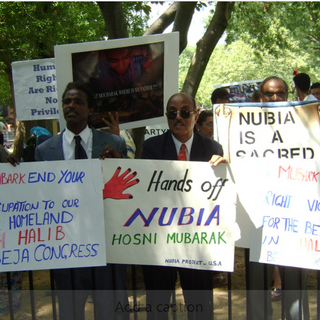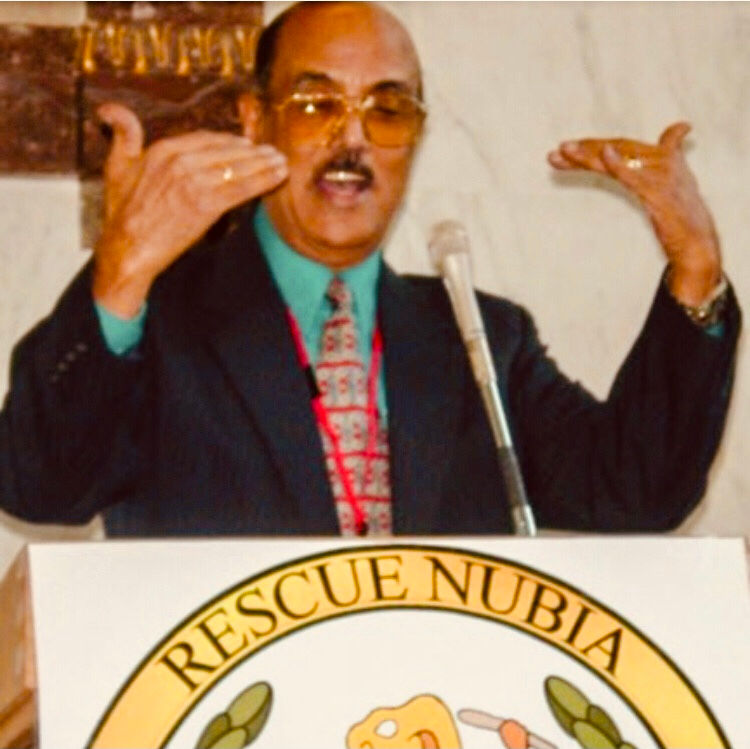Executive Summary
- nubiakey
- Oct 6, 2022
- 7 min read
Updated: Oct 11, 2022
NUBIA PROJECT
Save Nubia, the corridor to Africa and take Nubia to future
Date: August 7, 2009
Nubia Project is a non-profit organization formed on October 17, 2008, in Washington DC to protect Nubian culture and heritage and campaign against damming of Nubia and to urge the Sudan government to preserve the Nubian historical sites and stop displacement of Nubians from their ancestral lands, stop selling Nubian lands and resettling foreigners on their lands. It works with other indigenous and marginalized forces of Sudan to preserve the African cultures and heritage and to reviving Nobiin (Nubian) language with the help of linguistic institutions.
Nubians and their lands are under attack and at the crossroads facing the dangers of extinction and annihilation in the era rare and endangered species of animals and plants get more attention and protection from the civilized world. Nubia, once known in the past as the corridor to Africa, has witnessed waves of Arabization and cultural cleansing for centuries culminated by the daunting threats of damming and annihilation during the last few years.
A cultural onslaught more serious than the destruction of Buddha of Bamiyan by the Taliban of Afghanistan has been taking place in Nubia for decades while the civilized world is paying no attention nor exerting any effort to stop this crime against humanity. The pace of this cultural cleansing came in full fledge and reached its peak with the arrival of the Islamists to power in Sudan in 1989 when the Minister of culture and information threatened to destroy the Nubian monuments, considered by fanatic Islamists as symbols of paganism, while the National Islamic Front (NIF) military government launched its first attack on Nubians and Copts by hanging a young Nubian businessman and a Coptic pilot in December 1989.
The government of Sudan is building series of dams in Nubia, and already finished building Merowe dam in a very important historical area and in the process of building other dams on the 3rd cataract at Kajbar, one at Dal north of Kajbar at the southern tip of the High Dam Lake and a third one at El-Sheraik south of the Nile bend. These dams will wipe out Nubia from the maps after existing for thousands of years along the Nile with its fascinating historical sites showing the diversity of history and culture from Kush, Pharos, Greeks, Romans, Christianity to Arabs and Islam.
Our campaigns have started making breakthroughs as many Americans; especially the African Americans embraced the Nubian culture and history as their roots reference. The US Congress included Nubia in the far north of Sudan among the marginalized areas of Sudan in the Congressional Bill on Darfur Peace and Accountability Act and a group of Congress members and American organizations hosted in March 2008 a Nubian Day in the Congress. The International Society for Nubian Studies and the Boston Museum for Fine Arts, many faith groups and human rights groups have shown and expressed their unequivocal support to save Nubia from destruction.
Please save Nubia from damming, cultural cleansing and hegemony by making a pledge to donate your tax deductible to Nubia Project.
(Donation icon)
Nuraddin Abdulmannan
President of Nubia Project
Member of the Kushite Nubian Collaborative
(443)254-2765
Nubia Project Mission
The Nubia Project was founded in 2008 in Washington, DC by former Sudanese Ambassador Nuraddin Abdulmannan (aka Nuraddin Mannan), Khalid Gerais (aka Tanut Amon), Fagiri Gawish, and Mayada Mannan Brake. The group worked with many Sudanese organizations as human rights activists with other Sudanese activists in Sudan, the US, and Europe to expose the human rights violations in Sudan by the defunct Islamist military government of General Omer Elbashir. The need for forming a Nubian organization outside Sudan became necessary to support the Nubian resistance against damming Nubia, destroying its monuments, antiquities, and archaeological sites described by the British historian Basil Davidson as the largest archaeological site of the world.
In 1954 the Egyptian Government announced the construction of the Aswan High Dam, and due to massive protest by the Nubians of Egypt and Sudan who did not want to relocate from their land along the Nile, the Sudanese and Egyptian Government in 1959 requested UNESCO to save the Nubian Monuments from being swallowed by the powerful waters of the Dam. There was no regard to the Nubians themselves, conservative estimates claim over 160,000 Nubians between Egypt and Sudan were forced to move to the hot desert away from their hospitable fertile land. some did not leave and were swallowed, even some children were lost to the devastation of the water and forced migration when schools could not begin until third grade for Nubian children. This was the first Nubia project, to save some Nubian monuments, with no regard to the people. Former Ambassador Nuraddin Abdulmannan was part of this forced migration, and he was part of the Nubians that resisted the deliberate eraser of the Nobiin language by the Sudanese and Egyptian Governments at that time.
Nubia Project has helped in organizing the Nubians in the diaspora to oppose damming of Nubia, coordinating with the Nubians in Sudan with the Anti-damming movement that continues to relocate and culturally cleanse Nubians to adopt Arab identities and forget abandon their language and culture. The dictatorship that was recently removed in December 19, 2019, for 30 years planned the building of five Dams along the Nile, and this became a threat once more to Nubian groups in Sudan.
Nubia Project made the campaign international to garner support, and to once more bring attention not only to save Nubia from Damming only, but to save the Nubian people from cultural cleansing, and to make the Nobiin language as an officially recognized language by Sudan and Egypt as it remains banned and unrecognized in both countries.
Through many meetings, rallies, and demonstrations in front of the embassy of Sudan in Washington, DC, the Sudan Permanent mission in New York, embassies of Egypt, Saudi Arabia, and China in Washington, DC and sending messages to US Congress members and sister organizations, the Nubia Project has made a good breakthrough and relations with many organizations and activists and academicians especially among the African American organization and willing to promote relations by connecting the US and Sudanese organizations, universities, hospitals, businesses, communities etc., and getting help to develop and preserve the Nubian antiquities and historical sites and help in promoting tourism and develop the Nubian land resources and make it an oasis of peace and stability.
Today, few Nubians write the Nubian Language but spoken by millions of Nubians in Sudan and Egypt, and it remains as the oldest living written African language today. For Centuries the forcible and intentional systematic cultural cleansing continued, the successive Governments of Sudan and Egypt have played a destructive role in marginalizing and destroying the Nubian language and culture as well as many indigenous African languages by excluding their language from their school curriculum and implementing mandatory Arabic curriculums, and Arabizing indigenous groups to become assimilated into Arabic culture.
Nubian Students were routinely flogged and mocked for speaking the Nubian language. Students who fail in the Arabic language and Islamic Studies, automatically lose the opportunity for higher education and to further their schooling. All textbooks endorsed by the educational institutions in Sudan and Egypt do not mention Nubian history, but rather focus on the spread of Islam and Arabic language as a blessing and consider African Languages such as Nubian and culture as obsolete and uncivilized languages.
Today we are proud that former Ambassador and Linguist Nuraddin Abdulmannan, completed the first book on the Nobiin Language and Grammar-Book 1, and created a keyboard for the Nobiin alphabet, carrying forth the pioneering work of the late Dr. Mukhtar Khalil Kabbara, and Nubian linguist and archeologist, authored his book written in the Nobiin language and brought back to life! This standard of phonetics of the Alphabet can be found at the Nubian Documentation Center, Cairo Egypt. The design by the late Nubian Dr. Abdelgadir Shalabi and his continuous support through www.napata.org. We recognize the struggle of the Mother of Nubians, Kandake (Queen) Suad Ibrahim Ahmed, who devoted her life to the Nubian cause, and her efforts in Sudan to bring the Nubian language back to life through the Nubian Studies and Documentation Center in Cairo, Egypt. It is important for Nubians to build on this great foundation and be aware of it!
Nubia Project Objectives:
1. Save Nubia. Nubia is one of the oldest world civilizations and one of the safest communities in the world according to the UN records. Our mission is to save Nubia from destruction by dams and cultural cleansing, marginalization, isolation, and relocations.
2. Preserve our Nubian culture and heritage and draw the world’s attention to protect Nubian Heritage and archaeological sites.
3. Stop the Sale of Our Ancestral Nubian lands in Sudan and Egypt to rich Arabs and , Turkey, China, and refugees from Syria, Rohingya, Kuwaiti Bedoons, and militant Islamists from Egypt and ISIS to settle and change the demographic structure by displacing Nubians from their ancestral lands.
How You Can Help?
· You can you help to bring this written and spoken language by millions of Nubians to life and educate Nubian children in their mother tongue? You can help Nubia to recover from destruction and cultural cleansing by participating in our campaigns and events.
· Support Nubia Project in urging the international community to exert necessary pressures on governments of Sudan and Egypt to respect the Nubian rights in preserving their heritage, traditions, and culture and recognize their spoken and written language as an official language on equal footing with the Arabic language.
· We urge the international community to save this endangered ancient language, and that it should be made an official language in Sudan and Egypt. It is unfair that the Nubian language is not included in the curriculum of the American universities which have departments for African languages teaching African languages such as the Yoruba, Hausa, Afrikaans, Somali, Dinka, Nuer, Swahili, Amharic, etc.
· Nubia Project is leading a campaign urging UNESCO to ask the governments of Sudan and Egypt to recognize the Nubian language as an official language and be taught in their schools beside the Arabic language. You can join the campaign by signing the petition at:
.jpg)







Comments